Ateacher’s jobis priceless in many ways, yet it is highly undervalued in today’s society. According toa 2022 survey, less than one in five teachers would encourage a young person to pursue a career in education.And you don’t have to look far to find the reasons. Low salaries are reason enough: the gap between the weekly wages of teachers and college graduates working in other professions grew to26.4% in 2022. These are record numbers, considering the gap was only 6.1% in 1996.Teachers are the people shaping the next generation, so we should hold their jobs in high regard. However, the teacher-student relationship can sometimes go both ways. At least, this is what this person had in mind when they startedthis Quora thread. They asked: “As a teacher, what is the harshest truth a student has ever taught you?“Many educators shared the unexpectedlife lessonsthey got from their students, proving that a kid can teach a teacher something new about the world and life as well.This post may includeaffiliate links.
Ateacher’s jobis priceless in many ways, yet it is highly undervalued in today’s society. According toa 2022 survey, less than one in five teachers would encourage a young person to pursue a career in education.
And you don’t have to look far to find the reasons. Low salaries are reason enough: the gap between the weekly wages of teachers and college graduates working in other professions grew to26.4% in 2022. These are record numbers, considering the gap was only 6.1% in 1996.
Teachers are the people shaping the next generation, so we should hold their jobs in high regard. However, the teacher-student relationship can sometimes go both ways. At least, this is what this person had in mind when they startedthis Quora thread. They asked: “As a teacher, what is the harshest truth a student has ever taught you?”
Many educators shared the unexpectedlife lessonsthey got from their students, proving that a kid can teach a teacher something new about the world and life as well.
This post may includeaffiliate links.
That I am not the unbiased person I thought I was.Let’s call him Bubba. He was in a required freshman year experience class that all faculty rotated teaching. I normally teach statistics and research methods.Students are required to write a paper on any topic, as a method of our gauging their knowledge of things like APA style and that a sentence begins with a capital letter and ends in some form of punctuation. This assignment allows us to intervene early with students who simply cannot write and refer them for tutoring in their first semester.Bubba sat in the back of the room, cowboy hat tipped down, boots on the chair in front of him, chewing tobacco. Never said a word.The title of his paper was something like “The Use of Allegory and Metaphor in the Works of John Steinbeck.“I assumed he had copied or paid for it. There was no way this kid wrote it. I consulted a senior professor about what to do and she said, “Invite him to your office to discuss it. If he wrote it, he’ll be flattered. If he didn’t, he’ll be busted.“So, I did. Bubba tips back his hat, looks me in the eye and says,“Well, ma’am, when I was on the rodeo circuit, my partner gave me this book, The Red Pony, because I had to do a school book report and since it was about a horse, me and him figured it would be good. When I read it, though, it was about a lot more than a horse …. “Bubba went on at great length about all of Steinbeck’s books that he had read and what they meant to him personally.I was SO glad I had followed the advice to ask him about his paper instead of accusing him of cheating, and did I ever feel like an idiot!


Going anonymous as this is about my students, however real names are not used.I’m a maths teach at a local secondary school in an area where most students live off benefits. I had one girl, Daisy, who was highly intelligent, we did an iq test and her score was in the 140s.One day I asked her if she was going to university, no was her answer, I was puzzled, she excelled in class and had a keen interest in maths and science. She was proud too, wearing her maths and science award badges everyday.I asked her why, here was her response.‘I can’t afford it’Me:’you can get scholarships and grants’‘It’s not that, trust me I’ve checked, it’s the living costs.’That’s when I realised, this girl was 12 and knew she couldn’t progress further than college, not due to lack of talent or enthusiasm, due to money. I sat down with her, she cried all of one lunch in year 11, I cried to, at her potential wasted beyond belief, maybe the most talented student I’ve ever taught, not able to advance.I started a fund for all the children like her, unable to attend university due to money, and it worked. I raised enough to put her though and support her family, I’ve put other though uni too.I learnt that money is a problem and a worry for 12 year old girls but I also learnt talent can’t be wasted, children like her need a way to succeed.I hope I gave that to her, she now works as a medical researcher and was given the life she never thought she’d have.

School is not the most important thing in every student’s life.Early in my career, as an idealistic, demanding history teacher, I had a student (10th grade, so 15-16 years old) who was struggling to keep up with her homework and was at risk of failing. I berated her one afternoon for continuing to come up with excuses and for continuing to ask for extensions and not meet my expectations.I happened to catch her on the news later that week testifying in front of the state legislature, in support of a bill that would protect victims of sexual abuse. The bill carried her name.Taught me a small dose of humility and a large dose of humanity.




I was trying to rush through an explanation of a complicated physics concept before the bell rang, and the top student in my class raised his hand and said, “You know, just because you’re up there teaching, doesn’t mean we’re learning.“I’m sure many students have thought something like this in millions of classes around the world, but they don’t say anything (it would almost always be terribly impolite). The only reason this student said it, and got away with it, is that he was my 16-year-old son.

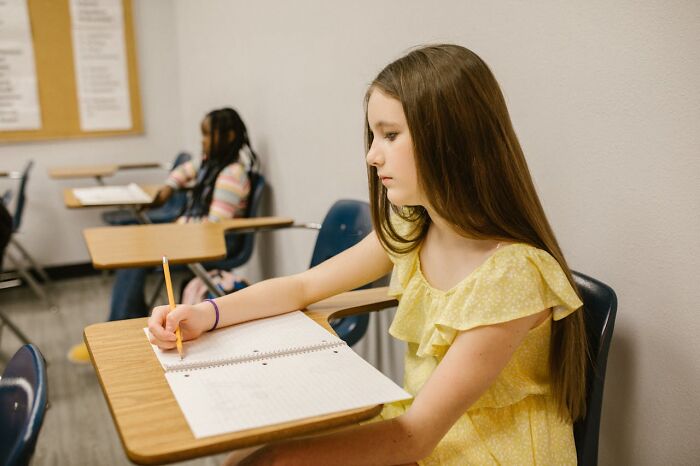

It was my second year teaching. I had a young man in my seventh period class (though at the time it was called “I” period). College-prep twelfth-graders. He was a very nice guy. Personable. Bright. Hard-working. I am very sorry that, 40 years later, I do not remember his name.A month or two into the school year, he started being absent. The absences increased. I would get requests for homework, I would get completed work to grade, and once in a while the kid would come to class. Right after Christmas vacation, another teacher comes in to tell me that he was on permanent homebound instruction, and she was his instructor. Would I please keep her up to date on everything we were doing in class and provide her with all the necessary books, materials, etc.Turns out he had leukemia. The last several weeks he was on homebound, his lessons were delivered to him in the hospital.He died before his class graduated.I was always impressed that even though he knew he was dying and probably realized that he would never live to receive a high school diploma or “use” anything he learned in school, he never quit. He never just said “What’s the use?” and lay back to die.That was a powerful lesson for a 23-year-old kid who was barely two years out of college.

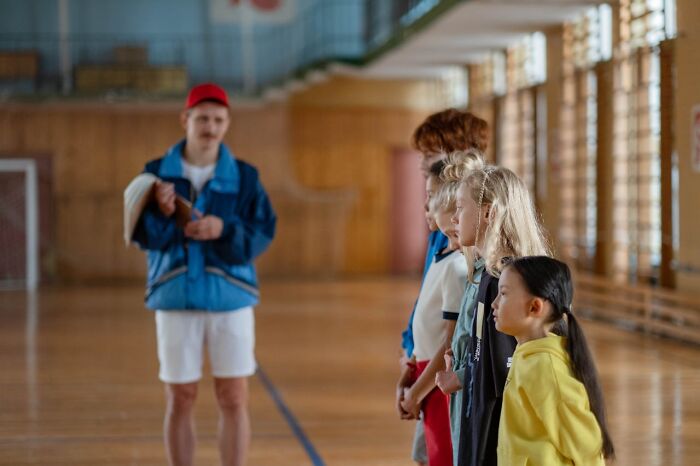
On a rainy Tuesday afternoon, my first grade students were roaming about the classroom, choosing activities as they saw fit for themselves.Since the students were busy I took the opportunity to straighten my desk.About ten minutes in, I noticed Niko was next to me with a pile of crumpled papers. I stopped what I was doing and looked at him. He was still mashing and crumpling papers into balls.I said, “Niko, I’m cleaning up my desk. And I think you know where that pile of paper balls goes.” I pointed at the trash can in the corner.He looked at me with his green eyes wide, “But Kathy, this isn’t trash!““No?““No! These are origami rocks. I’m making you a rock garden!“Its all matter of perspective. I no longer see crumpled papers the same way.
My wife and I call it the Anthony Chen response, named for the brilliant ninth grader who enlightened me. In an informal conversation before class, I was complaining about the stupidity of the actions and thinking of some group—I honestly don’t remember what we were talking about—and Anthony said, “Remember, Mr. Hays, half the world is below average.”The simple, obvious and horrible truth of the statement—something I’d never considered—overwhelmed me. I actually had to sit down and think after he said it. Now when either my wife or I are complaining about the idiocy of someone’s or some group’s (usually political) behavior, the other might say, Remember Anthony Chen!

One day a student walked into my class at the beginning of the period and stood in front of my desk. She said, “I have no idea who you are.”It took me a second to realize she wasn’t playing around. She had had a seizure that morning and was still recovering her memory. In spite of this, the student preferred to go to school and participate in her daily routine than stay at home. She got from class to class for the first half of the day with the help of her friends, whom she could recognize, even though she didn’t yet remember their names.At the beginning of the school year, this student had written me a note on her first homework assignment. The note was a response to some kind of rallying cry I had made—I had said something like, “All of you are capable of getting A’s in this class, and I hope that all of you will.” This student wrote, “I just want you to know that I’ll try my best, but I’m not smart and I’m not going to be able to get an A in this class.”The reason this student made such an impression on me is that she really was bright. She was quite smart. And so I pushed her, I encouraged her, I did everything I could to help her learn and succeed. But she just had one of those lives where everything keeps going wrong. A month or so after she had this seizure, her father died suddenly. The student was in and out of school for the rest of the year, and ended up receiving an incomplete in most of her classes—and so she was right. She didn’t get an A.The harsh truth I learned was that even when both the teacher and the student mean well, and pour everything they have into furthering the student’s education, there is a ton of crap that can get in the way. Sometimes you just have no control. And maybe all the effort, and thought, and positive energy you put into that student will make a dent in their life, but you as the teacher do not get to change the life of every student. Sometimes you do not even get to choose which students you help. There are forces at play that are much, much bigger than you.
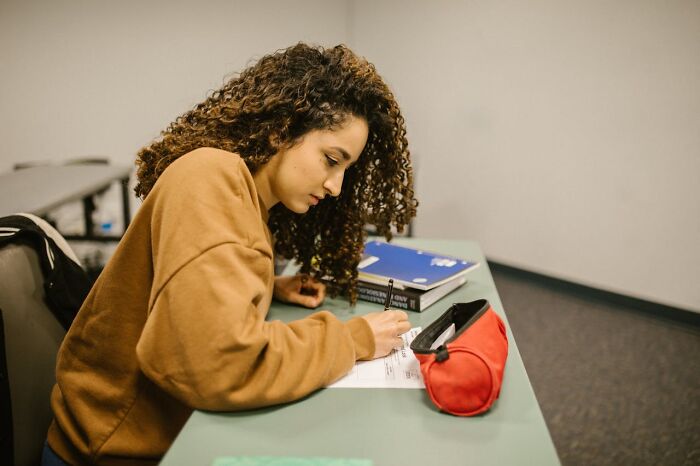
I had a student who came into my history class and told me how she hated history, hated me, and did not want to be there. She then said I am a black lesbian, EFF YOU whitey. I looked at her the class hearing this was not sure what or how I would react. I smiled and said, so does this mean we are not going to have lunch later. She looked at me as if to say something profound but just shook her head. Silence was deafening for a few minutes. It was our first day of class, I said my job is not to make you love history but my job is to assure that you have a basic historical understanding. I will make a deal with all of you, give me three classes, if you do not like what you are hearing, seeing, reading, or learning drop the class, add another class. But I ask you keep an open mind. We have a class section called stump the prof, its your turn to ask me history classes. It has to be related to American history is the only catch.She would ask me questions every class and they showed an understanding that I admired. She was not afraid to express herself, she was not polished, she was blunt and to the point. We watched a documentary on the Triangle Coat Factory Fire in the 1900s and said with a sadness in her voice, Prof that could have been me or any of us girls in this class. What she taught me is we all can change and become a better self. Her willingness to see these young dead women in caskets due to neglect made her realize it could have been her. She changed from a angry young woman to a stronger empathetic history lover.


I haven’t got anything as life changing as some of the other answers here, but still this made me reconsider some aspects of my teaching.I teach English as a second language in Norway. This happened in my first year of teaching.I was a new English teacher and very conscientious and thorough in everything I did. It was Friday, and the last session of the week. I was teaching in a class of 15 year olds, and I was giving the students back some written work which I had graded, commented and very thoroughly corrected.To give positive feedback is important!One guy in my class got his work back. He was not a very diligent student, but had probably done the best he could. His English left quite a bit to be desired, and I had painstakingly corrected every smaller and bigger mistake in his work with a red pen (of course).He got back his paper, looked at it with a tired glance and said so everyone could hear it.“Gee, who has poured blood all over my paper?” (In norwegian: “Hvem ere som har blødd på stilen min a?")With my back turned to the student, I just froze. I was delivering some other kid his paper, and I felt this kid’s pain. Here he had done the best he could do, and I, stupid teacher, had to correct and show him everything that was wrong. How does that feel to a tender young man? Even if you are not tender at all, but full of pimples and 6 feet tall? That has got to hurt. Of course it does. Is it any wonder that many students just look at their grade, and then throw their paper in the bin?After that I don’t usually correct every mistake. Especially if the student has a lot to work on. I try to find a few things to focus on for each kid, and also to focus on what’s good in the work they’ve done. Sometimes that is difficult, but I owe it to this student. (And every other student as well.)And of course, I will never again correct any student’s work with a red pen. I use a green one instead.
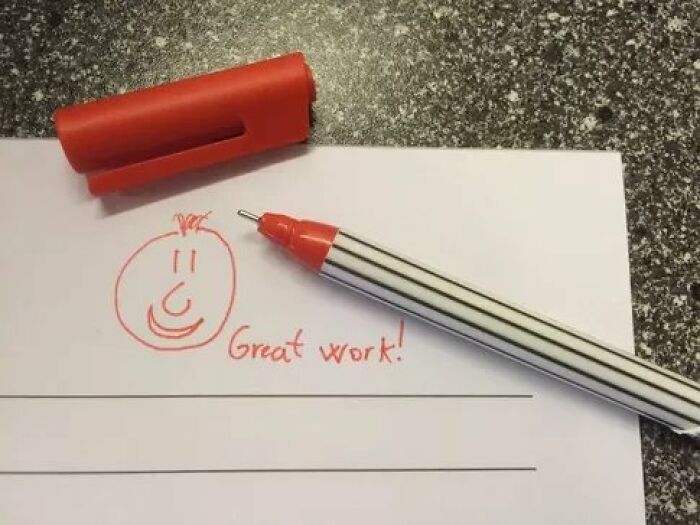
While handing out the literature list for the upcoming year of high school, I casually asked the students in my class what they thought about it. One girl raised her hand and said: “Are you at all surprised we don’t read but watch tv when teachers hand out these kinds of reading lists?“The list was full of English literature they couldn’t possibly understand regarding their proficiency levels and I suddenly remembered being discouraged myself when I had to read books like these while in high school.I made an appointment with the headteacher, took this student with me and tried to persuade him to get rid of the obligatory reading lists.During the next week’s lesson, I told the classes they could choose three of their own books. They did great during the oral exams.

In the final year of my 6 years of teaching Masters and PhD students, I had a student come up to me after class and kindly suggest that there was a much better way to approach the coding example I had just provided and showed me on my computer. I realized then that our skills are only good for at most 5 years. After that, all skills are obsolete.


Nothing I do matters if the child is not ready to learn.As captivating as I can be, when a child doesn’t have a place to live, regular sleep, food, warm clothing, and LOVE; processing my words is impossible.I can only control so much in a student’s life.I can make sure they eat breakfast and lunch, organize food/clothing drives, hug them and build them up, give their parents access to community services, and call CPS, but there is an awful lot of their life that I just cannot change.I learn these over and over again, but they’re heartbreakingly harsh each time.


I was teaching in a UK school and it was in a very rough area. There was a young girl of 11 whose parents didn’t have much, but she always looked happy.I recall I was starting to become rather disillusioned with teaching and thought that there were better things I could be doing with my life.One day, close to Christmas, I learned that this little girl had witnessed her father being shot and he died right there in front of her. I was mortified for her. Her mother came into school and said that because it’s so close to Christmas, she’d like to maintain the girl’s friendship groups and get her to share in the end of term fun with her peers, so she should remain in school. The school helped this happen in a very supportive way.The girls was in my class. We’d got to the end of the activities and we were waiting, lined up, for the end of class bell. I asked what everyone was getting for Christmas.“A BMX bike,” said one. “My mum’s getting me a Wendy house,” said another. The little girl’s hand went up in a shot and she had a gigantic smile beaming across her face and she said, full of the joys of Christmas, “I’ve asked Santa for a hoola-hoop,” she beamed. I was floored.This is a girl that had lost her father so violently and all she wanted was a hoola hoop. I was quite distressed that she wanted so little. But then I thought about it.All the others sounded so sure about what they were getting, about what their parents were buying them. It was clear that their belief in Santa had waned. But it was clear from her answer that her belief was still alive.This got me thinking about my own position. That no matter what you take from a child, their heart is always open to receive. That no matter what Hell has come to them, you can always take them on their own journeys, their own discoveries. And, in true Pandora’s Box style, no matter what you remove, hope remains.I thought to myself that as long as I can give hope, I’m making a difference to a child. Maybe I’m making them a stronger person; a better person. Maybe I’m making the world a better place through my small contributions to its future inhabitants. Maybe I’m not finished as a teacher; because there are lessons still to be learned.

Sometimes, you have to give up on someone and focus on the people you can help… the people who actually want your help.I know that’s a harsh thing for a teacher to say. We’re supposed to spend as much time as necessary to help every student achieve to the best of their potential.But that’s not the reality. If a student doesn’t want to succeed, there’s not much you can do to help them.So it was with a student I had five years ago. He never did any work and did everything he could to disrupt class. Frequent discussions with his mom (the dad was not in the picture at all) and frequent visits to the principal’s office did not help. I couldn’t kick him out of class. I couldn’t continue to let him disturb the class.So I had to give up on him.I gave him simple worksheets to do on his own, and let him listen to music while I was teaching the rest of the class. He put on his headphones and spent the entire class “looking for a good song” on YouTube. That is, he just watched videos. He didn’t do the worksheets.But at least he was quiet so I could teach the rest of the class.His mother even approved of this “alternate, independent learning plan” I came up with. She would have agreed with anything as long as she didn’t have to deal with it.Every few weeks I’d try to re-integrate him back into the regular classroom, but it always failed. He just didn’t care.He ended up going to a private high school in a special program that they had for students with behavior disorders. Then he got arrested for vandalism, kicked out of that school, and never enrolled in the public school. He became a dropout. The last I heard of him, he was in jail for stabbing someone in a drug deal gone bad.His classmates from the class I taught that year, on the other hand, are all college freshmen with bright futures. At least the ones that I keep up with are.

Words do matter.I teach in art and design, and unlike other fields, it involves a certain level of subjectivity and personal vulnerability. At the time, my primary teaching responsibilities were upper-level courses tasked with preparing students to become professionals.In this instance however, I was asked to teach first-semester freshmen — a rarity for me. The class went relatively well and at the end of the term, each student prepared their work for an exit interview and review.Normally, these reviews are conducted in faculty teams, but during this particular review, I was alone. No big deal, this wasn’t a problem student. She was a promising individual who showed interest and engagement in the arts. She participated in discussion, regularly attended class, and showed potential in digital work. The review was going fine until we covered the final semester grading — she fell just below an A and was clearly distressed and crushed. So, just as I had done dozens of times before, gave her rationale for the decision, walked her through the individual projects, and told her that learning, developing and ultimately the portfolio itself, were more important than any individual course grade.It didn’t matter, she was broken. Perhaps she had never received a B in her life, maybe I was too direct or too matter-of-fact, maybe instead of talking, I should have sat quietly and gave her a chance to speak. Whatever it was, I will never know, because when she walked out of the room that day, she didn’t come back.Through that experience I learned to choose my words more carefully. I learned that sometimes I should shut-up and listen instead of rationalize or justify. I also learned that a student’s mental stability should not be assumed or taken for granted. I used to think brutal honesty was the most fair approach to teaching, I was wrong.

I was teaching Freshman Comp as a grad assistant at the University of Michigan. It was a very nice setup, with no more than 17 per class. One class had a tall, reserved young man - boy, really - from somewhere inside Detroit, a place that was wracked with violence for the whole time I was a grad assistant.My first assignment was meant to ease people into writing on the college level: it doesn’t matter what it is, just talk about something you really know, and I mean really know.His essay stunned me. He recounted a time the previous year when he and three friends were walking down a main Detroit thoroughfare, going home from high school. A pickup truck suddenly stopped abreast of them and two men in the truck opened fire on the students. Two were killed. My student was spared. The truck sped off. Nobody was tracked or arrested.Since we had only 17 per class, our pattern was to hold one-on-one conferences after each paper. Despite my white, suburban background (which I knew without a single doubt totally disqualified me), I decided to forge ahead.When he showed up, we just looked at each other. Finally, I said, “I don’t know what to say. This is very moving, and I’m sorry you went through this.”He sat quietly for a long time. Then he asked, “Mr. Gehman, why would anyone do this?”A lot went through my mind. Detroit’s black population had soared during World War II as workers funneled north into the Willow Run Bomber Plant and the hundreds of vehicle and munitions factories popped up all around Detroit.Long-timers were suspicious, the crime rate had gone up, anger festered. Making it worse (or at least limiting abilities to co-exist), the bottom layer in and around Detroit had no truck with education…Maybe it was this anger that was boiling over. Maybe it was the inability of the ignorant to accept people other than their own. Maybe it was just in the air, ingrained in Detroit, always a brawling lake port and stifling, death-dealing heavy industry hive.“I don’t know,” I said. “It makes no sense.”I don’t remember how it ended or how I temporarily escaped the obvious realities of his life. I remember that he became a far better than average writer in less than a semester.But I’ve never been able to escape his lesson, even though I don’t really know what that lesson was.

One student asked if she can have a private tutoring session after school so I agreed. Feeling honored and proud that a student is asking for a 1-on-1 session, I was so eager to stay an extra 30 mins after school just for her.She arrived in the classroom and sat down with her head down. I thought she was sad or had a bad day. I pulled up next to her and opened up with “How’s your day?”“Not so good, Mr. Lam,” said the student. “My dad is threatening to take away my phone if I don’t make grades.”“But, you just started 9th grade a few weeks ago. You’re doing okay so far in my class,” I responded.“It’s not just your class, but all of my classes. If I don’t make grades, my dad will take away my phone and I’ll never get it back.” She said with the look of someone about to lose the most precious thing in life.I spent the next 30 minutes calming her down about her phone situation, grades, and dad. I was ready to leave, but I wanted to wrap this issue up. I asked her “What’s more important? Grades or phone?”“My phone.”I don’t know what it is that made this student so dependent on her phone. I understood how cool it was to even carry a phone when I was in middle school, but this was during the dumb phone era. Nowadays? It’s everywhere. I can’t tell if a student is happy to look down at their seat or just double-tapping that Instagram photo secretly.I learned that this student prioritizes differently from me. She is more concerned about the phone than grades but she can’t see past what’s in front of her. I wanted to tell her that losing a phone is not the end of the world and she should try to see what her dad was doing - the phone is just motivation to maintain her grades.After that day, the student did not improve in my class. She stopped asking for help after class. She sat with some distracting students and could not focus. Yes, she also was on her phone a lot in class. I was as much responsible for her demise in my class as anyone around her. I tried talking to her about her grades and poor behavior. It was as if she stopped fearing poor grades and losing phone privileges.TL;DR: Tried reasoning with a student about grades over phone privileges. Student eventually stopped caring about what anyone thinks of her educational well-being. Nothing more dangerous to a teacher than a student that doesn’t care about herself.

The harshest truth my students ever taught me is that it’s impossible to be entirely objective while teaching.Some students are simply more engaged in class.Some students are incredibly attractive.Some students are routinely brilliant with their answers.Some students ask the right questions.I try my best not to favor such students with more attention than others. In fact, I often go the other way, being much stricter on those I feel a bias toward.I stop myself returning the smile of the attractive student with an involuntary goofy grin, reserving it for the ones who are left-out in class. I hide the names on answer sheets while grading to prevent myself favoring students who’ve previously written great answers with a more cursory reading, while at the same time preventing myself being more intense on students who’ve given me bad answers before. In a hundred little ways, I try not to let my subconscious feelings translate into an outward bias.I suppose in many ways being 3–4 years older than my students is tough because I relate to them on so many levels. Preventing this from clouding my judgement is the hardest thing about being a teacher.
Continue reading with Bored Panda PremiumUnlimited contentAd-free browsingDark modeSubscribe nowAlready a subscriber?Sign In
Continue reading with Bored Panda Premium
Unlimited contentAd-free browsingDark mode
Unlimited content
Ad-free browsing
Dark mode
Subscribe nowAlready a subscriber?Sign In
Decades ago, I was teaching high school kids with mild intellectual disabilities. I was also the senior play sponsor/director. From the first day of play practice, I worked on responsibility. Being on time, learning your lines, taking care of props.On the week of the play, I reminded students to pick up props in my classroom the Monday after the play. Of course, they didn’t. I had it announced every day during morning and afternoon announcements. Still had a room full of props. Changed the announcement to say that any props left over Friday would be given away. My students with mild disabilities began “shopping”. Claiming props they wanted if not picked up.Friday came and there were half a dozen or so props left. One was a nice, but not new, makeup case, obviously from a set of matched luggage. One of my girls, Sandra, a quiet, low-key young lady, had looked at it longingly every day. When no one else claimed it, she asked shyly if she could have it. I said yes. Her eyes lit up as she picked it up and headed to the bus.I guess you can figure out what happened next. The student whose case it was showed up Monday to claim it. I explained to her that it had been given away. She was mad, but I stayed firm. A few days later, the principal called me in. He said he had gotten a phone call from an irate mother. The case was part of a matched set of luggage. She needed it back.My principal had been pushing personal responsibility all year. He supported my approach to the pick up of props. He had known of my plan ahead of time, and had approved it. The parent was loud, demanding, entitled. She would fight this one to higher authorities (school board or superintendent.) My principal said it was my decision and said he would support my decision, whatever it was.I chose badly. I succumbed to the pressure from the privileged Mom. I pulled Sandra to the side and told her what happened. I asked her to bring the case back. She looked very hurt, but resigned. She asked if I could take her home one day and pick it up from her house, she was embarrassed to carry it back to school on the bus. I wrote a note to her mom for permission to drive her home on Thursday.Thursday afternoon, I took her home. They lived in a small white house with flowers outside, right on the edge of the projects. The house was clean, neat and had all kinds of personal touches. I had never met her mom. The mom was much like her daughter, quiet, a bit hesitant. She apologized to me, which made me feel so much worse. I took the case, and called the owner.I felt wretched. I kept pictured Sandra’s face when she proudly carried the case to the bus. I did what I could do. I bought her a tote bag, a nice handled mirror, and a zippered cosmetic case. She was surprised and delighted. It may have been my guilty conscience, but I think she even liked this bag better.Sandra taught me a couple of harsh truths:1. The right path is usually toward protecting the vulnerable2. Sometimes the bullies win.3. Sometimes when you mess up big, you can’t fix it4. A little kindness can be healing
See Also on Bored Panda

My mom was a teacher. She taught middle school. She loved to teach. One day she got back home quite upset. She had been having a bad day, and took her anger out on one student. After she had finished her rant, she looked in the fear in the student’s eyes and realized, that even though she hadn’t said anything; the girl’s eyes told her that she had just lost any trust she had built up with the her.That day taught her, that her position could cause positive changes in kids, but it could also cause fear that she could never undo.
I think (or hope) I learned not to jump to conclusions. A student in a College Level class told me she had to miss the midterm, and could she write a make-up exam instead. I don’t think it was what I actually said, rather it was the the tone of my voice that that upset her. She said, “I’m sorry but I’m starting chemotherapy.”
I’m the Director of a private preschool. We had a toddler of Indian descent that had obvious and severe developmental delays. As the school year passed… His teachers and I had concerns that he was not progressing and as the other kids in the class were learning to walk, talk and feed themselves etc. He was a big child (in height and weight) and would not be able to progress to the next class with his peers and was too old/big to stay in the class he was in. I had a difficult discussion with his parents, suggested that he needed ECI (Early Childhood Intervention) and informed them that we were unable to meet his needs. His parents were completely clueless. We provided many resources for them and offered much advice. They ended up shipping him back to India, where family institutionalized him and basically shut him away to be forgotten about… as he was a “shame to the family”. It broke my heart. I realized that there are just some people that will always choose to take the easy way out and avoid an issue than meet it head on. Some parents are just unable to advocate for their child and some people should not be parents.
I have taught mathematics to students in the 3rd standard, to students who were preparing for CAT (Common Admission Test: The entrance exam for an MBA program in India) and to nearly everyone in between. It is fun to teach the same subject to such a wide range of age group. It teaches you a lot about teaching!OK, so about the truths I learned from my students.There is a plethora of things which I learned from my students, but because the question asks for one particular thing, here is one incident which I still remember vividly.Once, after a class was over, a 15 year old student, who was in the 9th standard, came to me and asked me to solve a complex geometry problem which he was having trouble with. He also had his mother with him. I was very young at that time and perhaps because of this, she was looking visibly incredulous. I felt alarmed. I didn’t want to look foolish before her.I confidently took the book from my student and peeped into it. The problem seemed simple. I took a pencil and began trying. It was a time when I used to have a lot of ‘performance pressure’ issues and I felt very uncomfortable, trying to solve a problem while the lady eyed me constantly. Normally I could have solved that problem in about 15 seconds but that day, even after a whole minute I was pissing in the wind.And then it happened. I heard my student say, “You will never get it done!”I couldn’t believe my ears. I had always believed, although subconsciously, that in this moment of crisis, he would be on my side. I stole a glance at him.I found him smiling, not laughing, not smirking, smiling!I don’t know what expression his mother’s face showed because I couldn’t gather courage to have a look at her.I got even more confused and just stared at him blankly. And then he spoke the magic words.“You will never get it done because you are not trying to solve the problem. What you are really figuring out is a way to get out of this awkward situation, probably because my mother is around.”I felt like Dr. Watson usually feels when Sherlock explains him something ‘trivial’. Eventually I cleared his doubt and like they say, the pleasure was all mine!Today, as a 24 year old person, I still feel surprised at the generic-ness of his observation. We are often told to ‘not to give a shit’ about what others think of us. But I learned something more fundamental that day.In pressured scenarios, mistakes happen not because of incompetence, but because of divided attention. Don’t try to run away, focus on the problem at hand.I learnt it, but I still struggle hard sometimes to actually ‘use’ what I learnt.

That I had no business being in front of a classroom.It was my first year of teaching junior high band. Well into the school year I discovered that one of my clarinet players had no clue how to play the thing and through pure embarrassment simply faked playing.Rather than dealing with her privately I spent most of the rest of the class trying to catch her up with two months of work, with her classmates giggling behind and her turning red with embarrassment and anger. I then realized I was teaching the subject and had no idea how to teach students.I lasted another two years and to everyone’s relief had a nervous breakdown, sought medical treatment and another field.
The harshest truth I ever learned from a student was that things aren’t as simple as they seem or we would like, and that not every situation has a straight forward, cut and dried solution.I’ve taught in a lot of places from elementary school to college to graduate university to prison, but this particular incident occurred on a basketball court when I was coaching a Boys’ Club team with my lifelong friend Lee McGee up in Harlem. Lee came from the same tough neighborhood in Brooklyn as Mike Tyson, whereas I came from the mean streets of New Hampshire and Western Massachusetts. He was head coach and I was the assistant. Our team consisted of 12 year olds who were a pretty unruly bunch of street kids who constantly challenged authority. This was particularly true of one kid, “Eric,” who was our best player. One day I was running a shirts & skins scrimmage while Lee was conducting a clinic with a few players. The teams I put together were a bit unbalanced, so I told Eric to switch over to the skins. His closest friends were all on the shirts team, and initially, he pretended like he didn’t hear me. Seconds later, Eric flat out refused, things escalated quickly, and Lee got involved. Eventually, Lee had some private words with Eric, had him run laps and sent him home. As Eric was leaving, I saw he was starting to cry, so asked Lee what was going on. Lee quietly told me that it was likely that Eric’s father beat him and he didn’t want the other players to see the marks. I was shocked and said, “If you suspected that, why the hell did you send him home???” Lee responded, “Rules are the one thing that separates us from the street and even some homes. These kids count on us to create an environment where rules apply. Without them, we don’t have a team and we lose ALL of these kids.” I still didn’t buy it and said, “Well, at the very least, we have to get social services involved.” Lee gave me a look that indicated that I didn’t know very much. “We do that and this will be the last time we ever see Eric in this gym and he will sure as hell take more beatings.” Later, Lee told me that he planned to check in on Eric and make low key inquiries with friends and neighbors.Next practice, both Eric and I showed up early. We shot around in casual silence and never discussed the previous practice. Lee and I never ran shirts & skins again. Eventually, we made a run for the city championship necessitating more practices. In the end, our team was league runner-up and Eric was voted MVP.A year later, we were coaching a team of 10 year olds. There was a kid who was slipping and sliding around in old shoes from the Good Will. Before the first game of the season, we met in front of a sporting goods store where I proceeded to buy him a pair of Nike high tops. Outside the store, the kid looked at the shoes with wonder, like they were the most beautiful thing he had ever seen. Then we proceeded to put dirt on the shoes and scuff them against the curb. When we arrived for the game, the other kids on the team all double-taked at the shoes but no one questioned his story that they came from a pawn shop. I had learned a lot since the previous season.
When I was teaching a freshman composition class—one of my first classes as a colllege instructor—a student blatantly plagiarized an essay. Now, this student had been struggling a little bit all semester, and I got the feeling that he really wasn’t all that engaged. When I saw he had copied large portions of his paper from the Internet, I knew I had to have a serious talk with him.The next class rolled around, and I gave the class something to do and pulled this young man out into the hall. I confronted him about his paper, and he denied it, saying that he wrote it. But I pressed him, and I could see his walls starting to come down. He began to tear up, and admitted he had copied it from another source. He went on to tell me about the myriad struggles he had at home and in his life in general, and how hard college was proving to be for him. And hearing his story, my seriousness about his plagiarized paper seemed so petty. I realized: sometimes school is not the most important thing, and that students live lives that are more complex and challenging than we often know. What feels like a life-or-death situation in the academic world is really just another challenge in some students’ endlessly challenging world—it’s all a matter of perspective.It shook my resolve as a teacher a bit, but I was able to calm the student down and talk things through. I obviously still had to deal with this problem, so I gave him 24 hours to rewrite the paper and in exchange would not pass the paper up to administration. To his credit, he wrote an entirely new paper, all his own words, and displayed an incredible resolve I won’t ever forget.
I’m a relatively new teacher, but I have already learnt far more than my students than I have taught them. The key things:1) Students will always know more than you do about something, and that’s not a bad thing. I try to make my students aware that if they know something and want to share that knowledge, I’ll facilitate that as much as possible - luckily I teach English which allows for lots of tangents!2) Don’t waste time. My students have taught me that their time is valuable, and that education is not one size fits all. When I’m teaching older students, I try to give them as much variety and choice as possible, so that they learn in a way that suits them. Sure, sometimes they won’t pick a task that is most worthwhile for them, but then they hopefully learn something about how to reflect on their choices.3) Pick your battles. Students are not robots, and they will have shitty days from time to time. So sometimes you don’t jump on a student for being late if they look like they’ve already had a rough morning. If a kid has her head down when you ask about homework, she probably doesn’t want it announcing to the rest of the class that she’s not managed to do it. I’ve learnt that a quiet word at the end of a class can be much more effective than bawling at a kid in front of their peers.I imagine that in a few years time, I’ll have picked up a lot more.
The harshest truth a student ever taught me was that I was not ready to teach young children.I was doing my student teaching, which involved working with elementary school children for five weeks and then working with high school children for five weeks.I was handing out supplies to second graders, and I was addressing the importance of waiting for instructions before starting anything and keeping their hands to themselves (Not marking on other students' papers, etc.). I looked over and saw a boy mark on the paper of the girl beside him. I went over and reminded him that they were not to mark on other people’s papers. He replied, “I didn’t.” I told him that I had seen him do it, and saying things that weren’t true is called lying. I asked him if he wanted to grow up to be a liar. At this point, he began sobbing, with shoulders heaving and everything. I felt like a jerk.My observing teacher took me aside and informed me that I had done a horrible thing to that child. I realized that I had absolutely no idea how to relate to young children in that environment. How would I handle other situations?I finished the student teaching at the elementary level and went on to the high school. I realized that I had a much more natural ability to communicate with that age group, while still maintaining a professional relationship. When I interviewed for jobs, I knew that I would be best suited for high school level instruction.If I hadn’t had that interaction, I might not have been as aware of my deficiencies, and I might have ended up being a not-very-good elementary art teacher. It was a harsh reality, but it was important for me, and I am much better off for having learned it when I did. I will also add that it taught me to think much more carefully about the words that come out of my mouth, because how my thoughts are expressed really does matter.
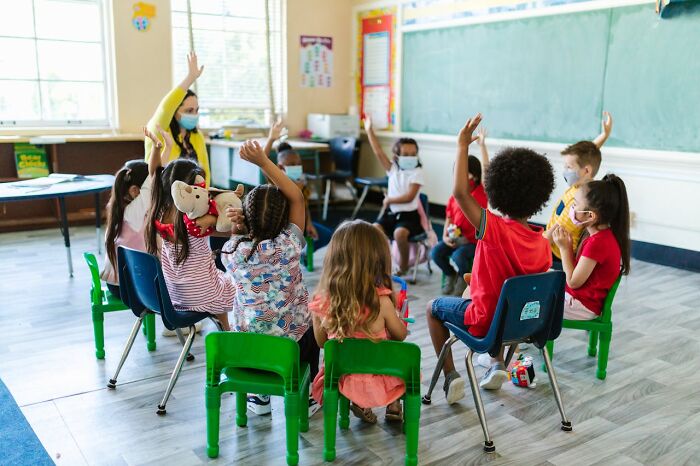
“Y’all are doin’ too much right now.” Several students chuckle.“What do you mean, D——-? We have to walk around and give instructions and plug these computers in. We’re teachers; that’s our job.”“Yeah but y’all are doin’ too much though.” More amused agreement, some tension waiting to see what we’ll say. We don’t really know what to say, though.It took maybe three more visits for my colleague and I to realize that she meant we were tryhards. We were trying too hard. Maybe to relate to the kids, maybe at something else that day, I can’t quite remember. But teaching in a juvenile detention center usually has one ugly truth at its core: there are some things you don’t have in common with your students and never will. That day, at least, we had it pointed out to us. Most days, it went better.
I’ll have to tell this story vicariously, as it was my girlfriend at the time who experienced this. She liked being hip and cool, and was kind of into the local band scene and she had purple streaks in her hair.One day after parent teacher conferences, she asked one of her students why she didn’t get to meet their parents, to which the kid replied “my parents said they don’t take people with purple hair seriously”.Obviously, the kid wasn’t supposed to repeat this, but I think it was eye-opening for her to see that sometimes you do have to adjust your style in favor of your professional environment, even if no one wants to actually admit that.
That schadenfreude knows no bounds.A long time ago, I was a primary school English teacher. My students were about 10–11 years old.One morning, one of them was missing. He was a quiet kid from a really conflictive—and poor—family. His father was a very violent man who used to regularly beat his eight brothers and sisters. Each one of his siblings had trouble at school or a miserable life, it seems this one—the youngest—was the one to be spared such cruel misfortune.The next day I was notified why he was missing. His father left him locked in a cabin where later a sailor sexually abused him.I was shocked.Then I was even more shocked when kids started making jokes regarding his absence.—He’s being uploaded to red-tube.Even girls were participating in the pun-fest about that tragic incident.—Will he come in a wheel-chair?I couldn’t stand it.—WHAT THE FUCK IS WRONG WITH YOU KIDS!?!?!?! I thought, before unleashing an avalanche of homework which would keep them busy enough for weeks.Three months later I quit my teaching job. Luckily I never needed it in the first place.
I’ve learned so many wonderful things from my students. I wish you hadn’t asked for the harshest. The harshest lesson I have ever learned as a teacher (and I don’t think it’ll ever get easier) is that you can’t save them all.I was teaching at an inner-city high school and Iban was one of my students though he rarely came to class. A lot of teachers had given up on him, but one of the assistant principals had given me his back story and, oh, I wanted to help him. I wanted to make him see that focusing on his education was the answer, that we were on his side, that we had his back. But I couldn’t get him to change his priorities and I lost him to the streets and it still hurts. And it always will. And I will always regret the ones I lose…
The harshest truth I have learned is that you cannot save them all. No matter how much you care for your students, no matter how good the relationship, some students come to us so damaged, they will not have the good lives we could wish they would have. It is the hardest thing I have had to learn in my many years of teaching.As a teacher in a public high school, I’ve had many wonderful students over the years who have flourished and prospered. I stay in touch with them. I celebrate and revel in their successes. But it is the children who failed to find their paths that keep me up at night.And sometimes, even years later, their faces and their situations haunt me. I always wonder, “Could I have done more?” “Could I have been more inspirational?”Teachers, as all teachers know, don’t just teach. We’re social workers, ancillary parental figures, club leaders, cheer leaders (for our students), tutors, curriculum designers, and social directors. I think we’re also, often, seen as jailers, which complicates our success in the aforementioned 7 tasks.Breaking through and teaching students who have developed a hatred for the educational system (and teachers) is our toughest task. Every teacher is held responsible for every bad teacher a student has had in the past and in many cases we have to reestablish trust in the educational system before we can begin to teach. And we have to do this while we teach 100 (or more) students a day, and grade those students work in a timely manner, and produce quizzes and tests, and manage to deal with other students’ problems as well.I can remember one student in particular, who broke my heart my second year of teaching in high school. He had had a teacher who told him in third grade that he would never amount to anything and he was doing his best to prove her right. I found out about that third grade teacher after having a very long conversation with this student about his behavior in my class. But understanding this student, and talking with this student, and tutoring this student, was not enough, and he eventually went off the rails, assaulted a teacher, and left our school. He was always very kind to me, but I knew he was volatile. Yet there was so much that was positive in him, I still grieve for what might have been- if only he’d been in a less challenging home situation; if only he’d had more interventions; if only he’d had more positive teachers along the way, things might have turned out differently.So my student taught me that no matter how much you care, and even if you do spend the extra time with a student, you may still fail to put that student on a path that will lead to success. But he also taught me that the time spent is not wasted, even if the intervention seems like a failure, because every relationship your build teaches you more about how to build them in the future, and that softens the hard truth a little, but not nearly enough.
I was a school teacher for 8 years and taught students from 13–16 years old. There was this student who talked non-stop during lesson despite me, so many times I warned her and I asked her to stop. In the end, I made her stand as a form of punishment and soon she started crying. I asked her if she wanted to go to toilet to cool down and she refused, after a while I let her sit down.I called her dad personally to explain the situation and her dad seemed to understand the situation and there was no unhappiness from his side.Guess what the dad came personally the week to see the vice principal who was one of my bosses. He complained that I was very fierce and whole class was scared of me and affect his daughter’s learning.In all my 8 years, there was no complaints from any parents nor about my teaching. The vice principal sided with the parent without even checking about the situation at all and ask other students in the class about the actual situation.I turned cold. The harsh truth I learnt that a shitty person usually have shitty parents and being shitty has nothing to do with age. This student was just 15 years old and definitely told a different story to her dad. I realised that I had lost all motivation at my job too given no support from higher management, not even any attempt to clarify the situation.My grade dropped (yes, Teachers are being ranked here) for first time below expectations. I quit my job less than a year after that incident.
I taught Primary in church for about two years (for those unaware, in the Mormon church, Primary is like Sunday School for little kids). In that time, I learned something deeply horrifying about humans.Not all humans are born “good,” and the awful ones will attract similar awful ones.I was teaching 6 year olds. There were five kids in my class. Two of them are the focus of this story. Note: names have been changed.Ellie was one of the girls, and Drake was one of the boys.Drake was, simply, your average 6 year old. He was a little hyper, and not always good at paying attention. But he was a great kid.During our lesson on holidays, he blurted out “Valentine’s Day must be about how Jesus loves us and so we should love other people and be nice to everyone!” I don’t care what the real answer was, I like his better.The other teachers weren’t fond of him. His hyperactivity wore on their nerves. They scolded him constantly.Ellie, on the other hand, was trouble. Not in the disrupting class way, but in the nasty, bullying, hitting the other kids and trying to hide it because she knew it was wrong.She was charming though. That was the big issue. Her charm made most of the teachers forget that she was trouble. They knew when they saw it, but somehow no one translated it into a pattern of behavior.Ellie’s least favorite classmate was Drake.At least once a class, Ellie would do something to try and get Drake in trouble. Sometimes she’d pinch so hard he screamed. Other times she’d go crying to the Primary President, saying he’d punched her and I wasn’t doing anything about it. Once, she gave him a piece of candy, and then ran off crying that he’d stolen it.Bad news, this girl.In Sharing Time (group lessons) I sat the kids three in front of me and two on each side. This let me keep the best eye on all of them. I always sat Ellie and Drake as far away from each other as possible to minimize the damage. Ellie was in front of me to the right, and Drake was next to me to the left.Ellie turned around and shouted “Drake just kicked me!” I looked at her and said in my most serious voice, “Ellie Fisher we do not tell lies!”She burst into tears. The primary president came over to comfort her.The Primary President was not someone any of us thought had any business being around kids. Her favorite punishments used humiliation, and she had no problem humiliating teachers and students alike. She’d gotten full custody of her daughter in the divorce, and we had no idea how she pulled it off. We only knew her ex-husband had somehow been shamed out of town of his own accord and put up no contest.She was basically a grown-up Ellie.Naturally, she adored Ellie. Her poor daughter. I had her in my class, and this woman regularly brushed off her own daughter’s hugs in favor of this girl. It was sickening.Ellie got a necklace with a hard, heavy, plastic pendant on it for Christmas. Within seconds of starting class, she’d taken it off and hit another child with it so hard it left a welt.“Ellie, this is your only warning. If I see that necklace off your neck one more time, I’ll take it until the end of the day,” I told her, following all the rules I’d learned from the teacher discipline information I’d read.She put it back on.Come sharing time, she took it off again. Then, quick as a flash, she reached across me and whacked Drake with it.“Ellie, give me the necklace. You can have it back when sharing time is over.”“But it was a present from Santa!” she wailed.“No buts. You had your warning. I told you what would happen. Give me the necklace now.” She jumped up and ran to the Primary President.“There there,” the Primary President consoled. “Your teacher is just being a meanie. She won’t do anything like that again.”Ellie moved away the next year, and the Primary President left the church when another teacher called her out on a different issue. The Primary President has been married three times since then, and has bled
- Teachers don’t have all the answers in the world. A student once asked me, why does the sun appears bigger at sunset compared to 12 noon. It was during a friggin' maths class. facepalm2. Teachers make mistakes too. I got the equation wrong. Alright. My mistake. Not the calculator’s fault (Although my calculator took the blame many times).3. Some of us don’t teach because we like kids or because it is our passion. We might be broke, jobless any clueless. So quit assuming that all teachers love kids. I particularly don’t.4. Teachers can be boring, grumpy and not fun. Probably many find it hard to digest that teaching is not a fun job. I taught third graders that found my annoyance amusing.
Modal closeAdd Your Answer!Not your original work?Add sourcePublish
Modal close
Add Your Answer!Not your original work?Add sourcePublish
Not your original work?Add sourcePublish
Not your original work?Add source
Modal closeModal closeOoops! Your image is too large, maximum file size is 8 MB.UploadUploadError occurred when generating embed. Please check link and try again.TwitterRender conversationUse html versionGenerate not embedded versionAdd watermarkInstagramShow Image OnlyHide CaptionCropAdd watermarkFacebookShow Image OnlyAdd watermarkChangeSourceTitleUpdateAdd Image
Modal closeOoops! Your image is too large, maximum file size is 8 MB.UploadUploadError occurred when generating embed. Please check link and try again.TwitterRender conversationUse html versionGenerate not embedded versionAdd watermarkInstagramShow Image OnlyHide CaptionCropAdd watermarkFacebookShow Image OnlyAdd watermarkChangeSourceTitleUpdateAdd Image
Ooops! Your image is too large, maximum file size is 8 MB.
Upload
UploadError occurred when generating embed. Please check link and try again.TwitterRender conversationUse html versionGenerate not embedded versionAdd watermarkInstagramShow Image OnlyHide CaptionCropAdd watermarkFacebookShow Image OnlyAdd watermark
Error occurred when generating embed. Please check link and try again.
TwitterRender conversationUse html versionGenerate not embedded versionAdd watermark
InstagramShow Image OnlyHide CaptionCropAdd watermark
FacebookShow Image OnlyAdd watermark
ChangeSourceTitle
You May Like30 Teachers Recall Crazy Excuses Students Have Given Them That Actually Turned Out To Be TrueShelly FourerThese 50 Mildly Interesting Pics Are Actually Pretty Intriguing (New Pics)Greta Jaruševičiūtė“Now Unrecognizable”: 30 People Share What Happened To The Prettiest Girl From Their HSMantas Kačerauskas
Shelly Fourer
Greta Jaruševičiūtė
Mantas Kačerauskas
Curiosities